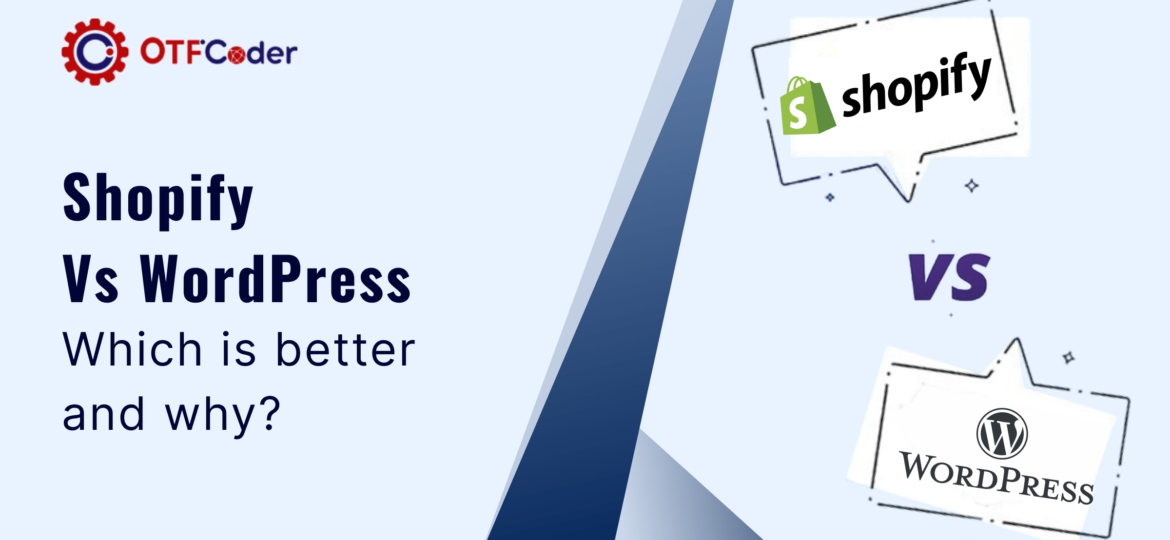
Selecting the appropriate platform for your online store is essential in the realm of e-commerce. Among the many options available, Shopify and WordPress are two of the most popular choices for building an online store. Both platforms offer numerous advantages and cater to different needs. In this blog, we will explore Shopify and WordPress in depth, comparing them across various factors to help you decide which platform is better suited for your business.
What is WordPress?

WordPress is an open-source content management system (CMS) that started as a blogging platform but has since evolved into a powerful tool for building all kinds of websites, including e-commerce stores. WordPress Website Development allows you to have complete control over your website’s design, functionality, and content. WordPress powers nearly 40% of the websites on the internet, making it one of the most popular website-building tools available. WordPress is available in two versions: WordPress.com (a hosted service) and WordPress.org (self-hosted). For e-commerce purposes, most businesses opt for the self-hosted version, which requires you to purchase a domain name, web hosting, and possibly additional plugins and themes to extend the functionality of your store.
What is Shopify?

Shopify is an e-commerce platform invented specifically for running online stores. With Shopify Website Development, you get a fully hosted solution, meaning Shopify takes care of all the technical aspects of running an online store, such as hosting, security, and software updates. Shopify is an all-in-one solution that simplifies the process of setting up, managing, and growing an online business. Renowned for its user-friendly interface, wide selection of apps, and integrated e-commerce capabilities, it has become a favorable option among small to medium-sized businesses.
Deciding Factors for E-commerce Platform Selection
When deciding between Shopify and WordPress for your e-commerce business, there are several key factors to consider. These factors will be the deciding factor for determining which platform aligns best with your specific needs and goals.
1. Ease of Usability
WordPress: WordPress offers a high level of flexibility. Setting up a WordPress site requires you to choose a hosting provider, install WordPress, select a theme, and add plugins for e-commerce functionality, such as WooCommerce. While this allows for a highly customized website, it also requires more technical knowledge and effort to get started.
Shopify: In contrast, Shopify is built with a focus on simplicity and user-friendliness. It offers a straightforward setup process with user-friendly tools that allow you to create an online store without any coding knowledge. Shopify’s drag-and-drop interface and pre-built templates make it easy for beginners to launch a store quickly. Additionally, Shopify takes care of hosting, security, and updates, so you can focus on running your business rather than managing the technical aspects of your website.
Final Verdict: If you prioritize ease of use and want a platform that allows you to set up your store quickly, Shopify is the better choice. However, if you’re comfortable with technology and want more control over your website’s design and functionality, WordPress offers greater flexibility.
2. SEO Capabilities
WordPress: WordPress is renowned for its strong SEO capabilities. With the right plugins, such as Yoast SEO, you can optimize every aspect of your website, from meta tags and descriptions to sitemaps and schema markup. WordPress also allows you to edit your site’s code, giving you complete control over your SEO strategy. This level of customization makes WordPress a powerful platform for businesses that want to prioritize organic search traffic.
Shopify: Shopify also offers SEO features which are more limited compared to WordPress. Shopify automatically generates a clean URL structure and includes essential SEO settings, such as meta titles and descriptions. However, advanced SEO customization is somewhat restricted, as Shopify does not allow full access to the site’s code. Additionally, Shopify’s app store offers SEO apps, but they may not provide the same level of control as WordPress plugins.
Final Verdict: WordPress is the superior choice for businesses that want to have full control over their SEO strategy. While Shopify’s SEO capabilities are sufficient for most users, WordPress offers more advanced options for those looking to optimize their site for search engines.
3. Customer Support
WordPress: As an open-source platform, WordPress does not offer direct customer support. Instead, users rely on a vast community of developers, forums, and online resources for help. While there is an abundance of tutorials and guides available, finding the right solution to a specific issue can sometimes be challenging, especially for beginners.
Shopify: Shopify excels in customer support. It offers 24/7 customer support via live chat, email, and phone, as well as a comprehensive help center with articles and tutorials. Shopify’s support team is knowledgeable and responsive, making it easy for users to get assistance whenever they need it.
Final Verdict: If customer support is a priority for you, Shopify is the better option, providing reliable and accessible support around the clock. WordPress, while offering a wealth of community resources, may require more effort to find solutions independently.
4. Pricing Strategy
WordPress: WordPress itself is free to use, but there are costs associated with running a WordPress e-commerce site. You’ll need a budget for hosting, a domain name, and any premium themes or plugins you decide to use. While this allows you to control your expenses and only pay for the features you need, costs can add up, especially if you require advanced functionality.
Shopify: Shopify operates on a subscription model, with several pricing tiers depending on the features you need. The basic plan starts at $29 per month, and higher-tier plans offer additional features such as professional reports and advanced shipping options. Shopify also charges a transaction fee if you don’t use Shopify Payments as your payment gateway. While the pricing is straightforward, it can become expensive, especially for larger stores or those with high sales volumes.
Final Verdict: WordPress offers more flexibility in terms of pricing, allowing you to control costs by only paying for what you need. Shopify’s pricing is more predictable but can be more expensive, especially for growing businesses. Your choice will depend on your budget and how much you’re willing to invest in your e-commerce platform.
Conclusion
Both Shopify and WordPress have their strengths and are suitable for different types of businesses. If you’re looking for a simple, all-in-one solution that allows you to set up an online store quickly without dealing with technical aspects, Shopify Website Development is likely the better choice. Its ease of use, strong customer support, and comprehensive e-commerce features make it an excellent option for small to medium-sized businesses. On the other hand, if you’re comfortable with technology and want complete control over your website’s design, functionality, and SEO, WordPress Website Development may be the better fit. WordPress offers unparalleled flexibility and customization options, making it ideal for businesses that want to create a unique online presence and have the resources to manage a more complex platform. Ultimately, the choice between Shopify and WordPress depends on your specific needs, technical expertise, and budget.


